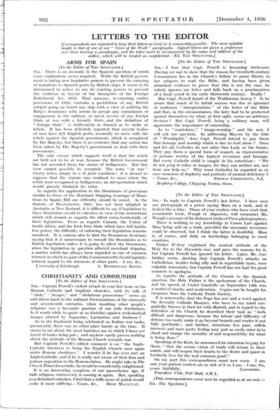Sin,—In reply to Captain Powell's last letter. I have seen
one photograph of a priest saying Mass on a tank, and it [To the Editor of THE SPECTATOR.] Sin,—In reply to Captain Powell's last letter. I have seen one photograph of a priest saying Mass on a tank, and it looked like a fake. Those of your readers who have read that remarkable book, Waugh in Abyssinia, will remember Mr. Waugh's account of the dishonest tricks of Press photographers.
There is nothing to my knowledge in Canon Law against. Mass being said on a tank, provided the necessary reverence could be observed, but I think the latter is doubtful. Mass is, of course, said daily on battleships belonging to most countries.
Father D'Arcy explained the neutral attitude of the Holy See to the Abyssinia war, and gave the reasons for it, but Captain Powell has ignored his letter. Later, Mr. Cor- bishley wrote, showing that Captain Powell's attacks on Catholicism, besides being silly and in regrettable taste, were culpably inaccurate, but Captain Powell has not had the good manners to apologise.
As regards the attitude of the Church to the Spanish question, the Holy Father is the spokesman of the Church, and his speech at Casiel Gandolfo on September 14th was a model of charity and moderation. Copies can be bought for twopence from the Catholic Truth Society.
It is noteworthy that the Pope has not said a word against the devoutly Catholic Basques, who have to my mind mis- guidedly thrown in their lot with Madrid, and in regard to the defenders of the Church he described their task as " both difficult and dangerous, because the labour and difficulty of defence too easily make it go beyond bounds and render it not fully justifiable ; and further, intentions less pure, selfish interests and mere party feeling may just as easily enter in to cloud and change the morality of and responsibility for what is being done."
Speaking of the Reds, he announced his intention to pray for them, " that the serene vision of truth will return to their minds, and will reopen their hearts to the desire and quest in brotherly love for the real common good."
On my part this correspondence must now cease. I am sure your patient reader's are as sick of it as am.—I am, Sir,
yours faithfully, CLONMORE. Travellers' Club, Pall Mall, S.W.I.
{This correspondence must now be regarded as at an end.— ED. The Spectator.]




















































 Previous page
Previous page